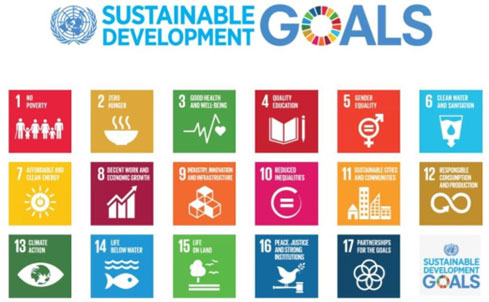We have officially entered a new era for businesses worldwide; while being profitable is still at the forefront of what makes a good business and investment, we now have new benchmarks requiring that companies help society meet its biggest challenges – protecting our habitat and planet.
Governments and private sector organizations alike have been working hard for a couple of decades to address the environmental and social challenges our world faces today, a movement that was fueled by issues like climate change, depletion of resources, and an understanding that diversity, equality, and inclusion add value to human performance.
Climate Change – A Global Emergency
Recognizing that the negative impact of climate change can no longer be ignored, The UN (United Nations) Climate Change Conference (GOP21) in Paris reached a breakthrough in December 2015: The Paris Agreement. This agreement was created to guide all nations to substantially reduce global greenhouse gas emissions and pressures them into action by reviewing countries’ commitments every five years. 193 countries plus the European Union entered into this agreement which marks the beginning of a shift toward a net-zero emissions world. Implementing this agreement is essential for achieving the Sustainable Development Goals created by the United Nations (UN) Department of Economic and Social Affairs.

The topic of sustainability was again brought to the forefront when the United Nations (UN) Department of Economic and Social Affairs created Agenda 2030 for Sustainable Development with 17 Sustainable Development Goals (SDGs) at its core – which was adopted by all United Nations Member States in 2015 and provides a blueprint for peace and prosperity for people and the planet. This agenda is essentially a universal call to action to all countries in global partnership and the recognition that ending poverty and other deprivations must go hand-in- hand with strategies to improve health and education, reduce inequality, and spur economic growth while also tackling climate change and working to preserve our oceans and forests.
Just four years later, the COVID-19 pandemic, which disrupted every industry and affected consumers around the globe, supercharged this clear trend, and companies are not only being pushed by government requirements and consumer demands, but they are now also feeling pressure from investors, customers, and employees.

The Organization for Economic Co-operation and Development (OECD) is another intergovernmental organization founded to stimulate economic progress and world trade, and committed to democracy, market economy, and the coordination of international policies for the greater good of all. As artificial intelligence plays a significant role in finding energy solutions for sustainability, this organization created an international agreement for building trustworthy artificial intelligence (AI), marking a first step in a global approach to foster innovation and trust in AI by establishing principles for the responsible development of AI, while ensuring respect for democratic values, and protecting the safety, security, privacy, and confidentiality in data used for AI research and development and promoting the importance of upholding civil liberties, privacy, and values. It also calls for policymakers to prioritize AI research and development, while promoting inclusive growth, human-centered values, transparency, safety and security, and accountability.
Industry experts around the world agree that paying attention to environmental, social, and governance (ESG) issues has become a MUST for the long-term success of all companies across all industries.
Leading global corporations including Procter & Gamble, General Electric, Pepsi, Coca-Cola, Biogen, Walmart, IKEA, Nestlé, Unilever, Nike, and JetBlue, are not only embracing
sustainability and ESG, but they have now fully aligned their strategies around sustainability goals with the mission to obtain net zero by using sustainable materials, aligning supply chain ecosystems, reducing carbon emissions, or attaining carbon neutrality through offsetting emissions, reducing waste, using renewable energy, recyclable or reusable packaging, and optimization of material usage, etc. These firms have made strong commitments to sustainability through transparency, and we are confident in our belief that all companies will need to follow suit over this next decade if they want to remain competitive and enjoy long- term success. Companies that drag their feet will lose out.

Sustainability for Business
Implementing a corporate sustainability strategy is typically based on three main pillars:
ESG – Economic, Social, and Environmental. It defines the company’s impact on the environment and society. Often referred to as the “Triple Bottom Line” or “the 3 P’s” (Planet, People, Profit), an effective strategy around sustainability and ESG is key to long-term success.
Employees remain the company’s greatest assets and therefore at the forefront of every successful business. Adopting an employee-centric approach helps companies grow and succeed, and greener strategies tend to result in higher employee engagement.
Sustainability and ESG strategies create Long-Term Value for Businesses
- Create opportunities and increase revenue:
According to a study from McKinsey, consumers are willing to pay 5% more for greener products, with Millennials and Gen. Z at the forefront and placing a high value on ESG and sustainability.
2. Attract top talent
Employees’ expectations have changed drastically in the last decade and employees expect to align their professional environment with their own values, especially when it comes to social injustices, ecological impact, and sustainability for a better planet. Adopting sustainable practices attracts better talent and customers.
3. Brand Image, Customer, and Investor Trust
In addition to improved brand image, aligning with companies that share similar corporate values is becoming a critical aspect for consumers, workers, suppliers, and investors alike. With climate change being a main concern, the general population now expects corporations to act, and consumers are willing to pay more to support that trend.
4. Cost Reduction
Numerous studies have demonstrated that ESC can lower operating costs drastically when done strategically.
Steps to Create and Execute a Sustainability and ESC Strategy:
- Understand and Define Stakeholder Expectations
To deliver long-term value, it is imperative that your company understands and responds to the needs of the communities it serves. Alignment of the board, management, employees, partners, and suppliers will generate significant environmental, social, and financial value for all stakeholders. Shared goals and shared accountability are key elements of a good sustainability strategy.
- Establish measurable goals that reflect a broader purpose and vision your entire company can get behind. Leaders must demonstrate their commitment through their own accountability and transparent processes, policies, and reporting
- Technology and innovation will fuel your transformation
- Monitoring and reporting are vital elements to maintain trust and
As executives are still dealing with the aftermath of the pandemic, new technology trends, and market challenges including inflation and currency fluctuations, they are often reluctant to add sustainability as a core element to their business strategy for fear that the investment will outweigh the rate of return. Yet, if done right, the opposite is true.
How to Improve Your Sustainability Practices:
- Align your strategy with
- Focus on compliance, sustainability, and human rights first. Competitive advantage will
- Link sustainability to a business case to quantify the return on sustainability
- Transparency through open communication with all key
- Engage the Board and your entire
In summary, sustainability is not just a megatrend, it is a business imperative. Do not wait for regulations to force your hand. If you want to remain competitive in today’s world, you must prioritize sustainability as a core value and use it as a competitive advantage to reduce operating costs and attract customers, investors, and talent who share your values.
The question is, is your company ready to embrace the challenge? Have you defined your sustainability strategy and roadmap?
At Altix Consulting, our expertise focuses on making an impact on four of the most important OECD goals: Quality Education – the backbone for successful integration of innovation and transformation, Decent Work and Economic Growth, Industry Innovation and Infrastructure, and Responsible Consumption and Production. We believe that these are essential to achieve successful innovation and business transformation, which in turn ensures future successes for the company and society at large.
Our industry veteran Advisors partner with clients across many industry sectors to advise them on sustainability and ESG. Our team helps companies lead the way through innovation and technology, operation excellence, resilient sustainable supply chains, cost reduction through sustainability, and transformation to reach net zero.
ABOUT THE AUTHOR
Yannick Schilly is Co-Founder and CEO (Chief Executive Officer) of Altix Consulting. He is a highly experienced senior strategic advisor, industrial engineer, and former Industry Executive with 30+ years of experience developing and executing global expansion strategies and
establishing and managing regional production and logistics centers with a focus on sustainability in Europe, China, and North America. His unique expertise encompasses all aspects of global and international business, market-entry, industrial best practices, and excellence in advanced manufacturing, industrial engineering, logistics and multi-national supply chain management.












